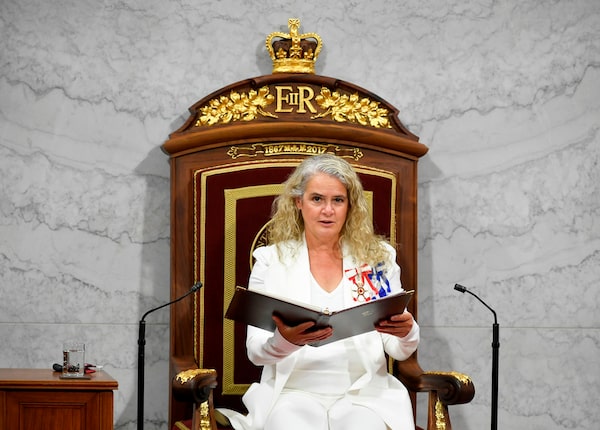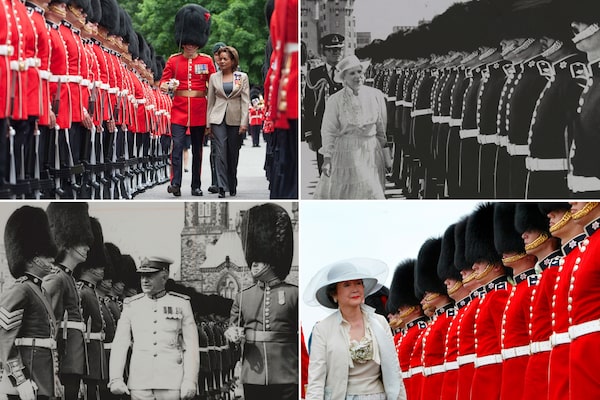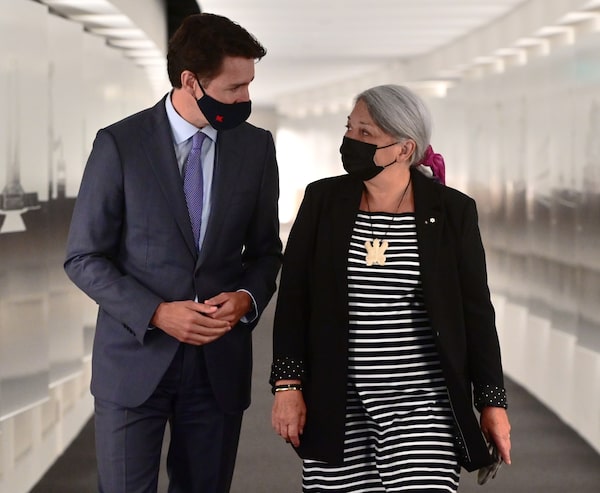Governor-General Julie Payette bumps elbows with Chief Justice Richard Wagner on Sept. 23 as she arrives to deliver the Throne Speech at the Senate chamber in Ottawa. Four months after this picture was taken, Ms. Payette resigned, Chief Justice Wagner took her post and Prime Minister Justin Trudeau, shown at back, began the search for a replacement.Patrick Doyle/Reuters
When Julie Payette arrived at Rideau Hall, she was lauded her for her accomplishments as an astronaut, scientist and public servant. But when she left – two years ahead of schedule – she was accused by her employees of bullying behaviour that made the governor-general’s office a toxic place to work. That left Mr. Trudeau with two challenges: Finding a replacement – which he now has in Mary Simon, an Inuk advocate and former Canadian diplomat – and answering hard questions about how Ms. Payette was vetted for the post. Here’s a recap of the controversy.
What’s Julie Payette accused of doing?

Ms. Payette delivers a Throne Speech.ADRIAN WYLD/POOL/AFP via Getty Images
In July of 2020, CBC News first reported that several staffers had left Rideau Hall over what confidential sources called bullying by governor-general Julie Payette. The Privy Council Office launched an independent review, eventually hiring Ottawa-based Quintet Consulting Corp. to interview people involved.
On Jan. 21, 2021, multiple sources told The Globe and Mail that Quintet’s report had reached the Prime Minister’s Office, and its damaging findings would make it difficult for Ms. Payette to continue in her role. Hours later, Ms. Payette issued a resignation statement that began as follows:
Everyone has a right to a healthy and safe work environment, at all times and under all circumstances. It appears this was not always the case at the Office of the Secretary to the Governor General. Tensions have arisen at Rideau Hall over the past few months and for that, I am sorry.
She stressed that no official grievances were filed during her time as governor-general, which would have “immediately triggered a detailed investigation as prescribed by law and the collective agreements in place.” Quintet’s report, released in redacted form on Jan. 27, confirmed this fact. But it also described a pattern of “toxic” behaviour at Rideau Hall, based on 92 interviews with current and former employees and other “knowledgeable individuals.” Key findings include:
- “Reports included allegations of yelling, screaming, aggressive conduct, demeaning conduct and public humiliations,” Quintet found in interviews conducted from Oct. 19 to Nov. 23, 2020.
- Over all, 43 described the workplace as hostile or negative. Twenty-six described the Office of the Secretary to the Governor-General’s work environment as “poisoned” or “toxic,” and eight used the words “climate/reign of fear/terror.”
- Seventeen participants said they had left Rideau Hall during Ms. Payette’s tenure because of this climate, and 13 said they had taken sick leave because of it.
- Employees felt the human-resources practices at the OSGG were “inadequate” and the complaints process needed to be reviewed. “The fact that employees did not feel they had a place to go with their complaints made the work environment ‘really unhealthy’ to the point people felt they had to go to the media,” the report found.
- Quintet concluded that “there is a serious problem” requiring immediate attention from the Privy Council Office, the agency in charge of the public service.
How was Payette vetted for the governor-general’s post?
Ms. Payette waves as she and other crew members on space shuttle Discovery head for the launching pad in May of 1999.Todd Anderson/REUTERS
Ms. Payette, 57, was a famous name for the Trudeau government to bring to Rideau Hall. She’s a former Canadian Space Agency astronaut who served two missions aboard the International Space Station, and was the first Canadian to board the station in 1999. After leaving the CSA, she was chief operating officer of the Montreal Science Centre and a vice-president at the Crown corporation that runs it, the Canada Lands Company. She left the science centre abruptly in 2016, a year before Prime Minister Justin Trudeau tapped her to be the next governor-general, a post she assumed in October of 2017.
Much is still unknown about how the Prime Minister’s Office settled on Ms. Payette as the best choice in 2017, other than that they did not use the Harper-era committee for shortlisting candidates for viceregal posts (more on that later). Three sources with knowledge of the process told The Globe Ms. Payette’s ex-employers were not consulted as part of a background check, nor was Marc Garneau, a federal cabinet minister and former astronaut colleague of Ms. Payette’s.

Governors-general inspecting the ceremonial guard over the years, clockwise from top left: Michaëlle Jean in 2009, Jeanne Sauvé in 1984, Adrienne Clarkson in 2005 and Roland Michener in 1972.The Canadian Press, UPC, Reuters, The Globe and Mail
The governor-general explained
What the governor-general does
Governors-general represent the Queen, Canada’s head of state, and carry out some of the key ceremonial functions that keep our constitutional monarchy running. Their duties include:
- Dissolving and opening Parliament: The governor-general is arbiter of whether the prime minister has the confidence of the House, a role that’s especially important in minority Parliaments like the one we have now, where the failure of a confidence motion could bring the government down. When it’s time for a federal election (which could come as soon as this spring), the governor-general is the one who starts the process. Then, when a new parliament begins, the governor-general reads the Throne Speech setting out the government’s priorities.
- Political oaths: The governor-general administers the oaths of office to prime ministers, cabinet ministers and chief justices of the Supreme Court.
- Royal assent: Once bills are approved by the House and Senate, they have to be assented to by the governor-general before they come into force. No governor-general has ever refused such assent.
- Diplomatic duties: Abroad, governors-general represent Canada at state functions. At home, they play host to visiting foreign leaders and receive official documents from new ambassadors that allow them to take their posts.
- Military duties: The governor-general is commander-in-chief of the Canadian Armed Forces, whose duties include awarding military honours, attending memorial services and appointing the chief of the Defence Staff (at the prime minister’s recommendation).
To perform these roles, governors-general have to be strictly non-partisan, though some have had careers in party politics before Rideau Hall (like Manitoba’s NDP premier Ed Schreyer).
Roméo LeBlanc gives broadcaster Peter Gzowski his Order of Canada medal in 1999, the year he stepped down early as governor-general for health reasons.Tom Hanson/The Canadian Press
What happens if a governor-general quits?
The chief justice of the Supreme Court takes on the viceregal duties temporarily if a governor-general dies in office, is incapacitated, resigns or is fired (which is something only the Queen can do, at the prime minister’s recommendation).
Federally, there hasn’t ever been a viceregal resignation as abrupt as Ms. Payette’s; Roméo LeBlanc stepped down early in 1999 due to health problems, but he stayed long enough for prime minister Jean Chrétien to find a replacement. Chief justices are more likely to take the reins in the event of the governor-general’s death, as happened with John Buchan, Lord Tweedsmuir, in 1940 and Georges Vanier in 1967.

Mr. Trudeau and Mary Simon arrive at the Canadian Museum of History in Gatineau, Que., to announce her appointment as governor-general.Sean Kilpatrick/The Canadian Press
Who’s the governor-general now?
Mary Simon, an Inuk politician and ex-diplomat, has been confirmed by the Queen as the new governor-general, Mr. Trudeau announced on July 6 alongside her in Gatineau, Que. Asked about the strained work culture at Rideau Hall, Ms. Simon said she looked forward to meeting her team and building a good working relationship with them: “I am fully committed to setting and maintaining the highest standard of work ethics in all aspects of my duty.”
The selection of Ms. Simon took months as an advisory group of academics, Indigenous leaders and public servants prepared a shortlist for Mr. Trudeau to choose from. During that time, the Supreme Court of Canada’s Chief Justice, Richard Wagner, carried out the governor-general’s duties under the title of “Administrator of Canada.”
Commentary and analysis
Editorial: Payette is what happens when Trudeau turns everything into a branding exercise
Tanya Talaga: An Indigenous governor-general wouldn’t mean reconciliation. It would mean nothing
Campbell Clark: Report on Julie Payette reveals next to nothing
Andrew Coyne: It matters who Canada’s governor-general is
John Fraser: Payette’s tragic appointment wouldn’t have happened under Harper’s system
Compiled by Globe staff
With reports from Robert Fife, Kristy Kirkup and The Canadian Press
Know what is happening in the halls of power with the day’s top political headlines and commentary as selected by Globe editors (subscribers only). Sign up today.